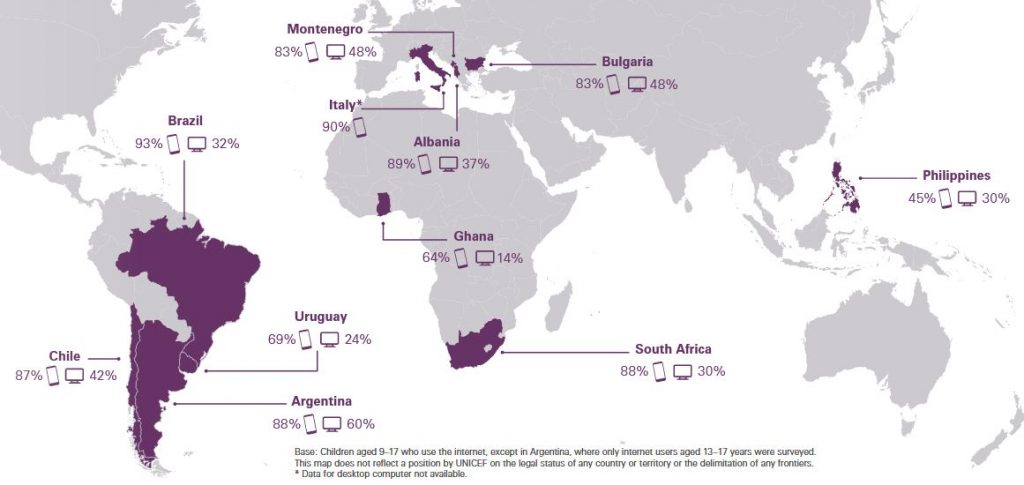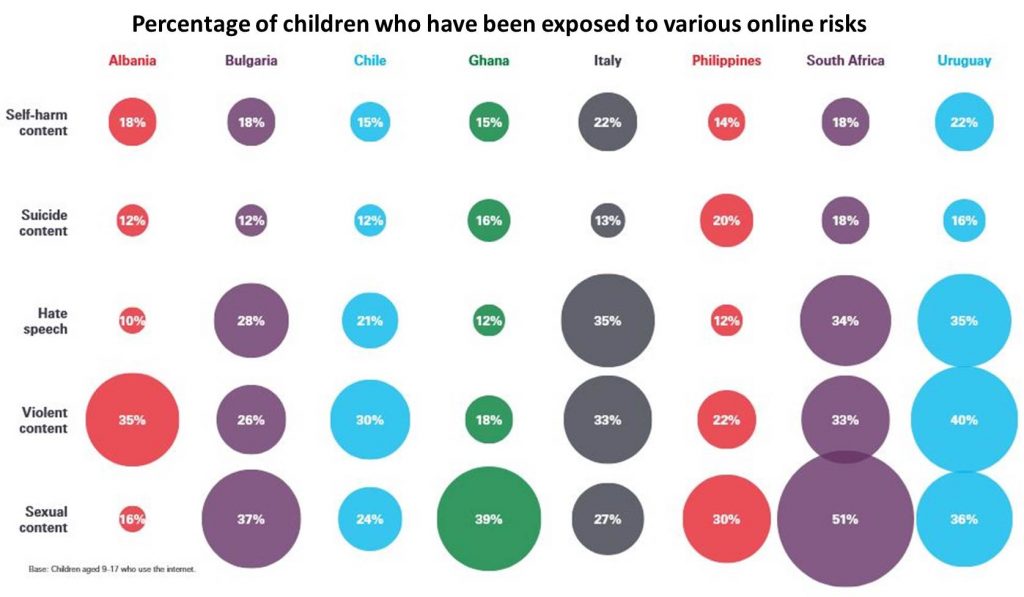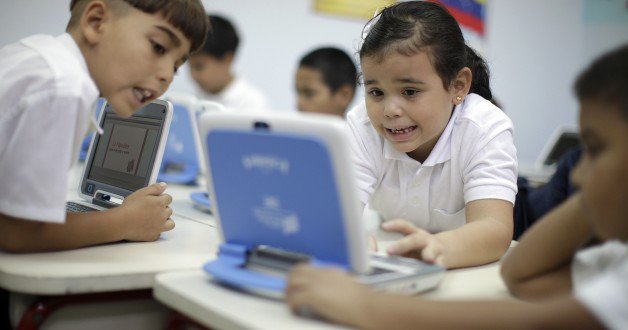

 Much attention is focused on the potential risks for children using the internet, but new research stresses how important it is that children spend time online in order to learn how to navigate these risks, and make the most of the opportunities offered. Sonia Livingstone, Daniel Kardefelt-Winther and Mariya Stoilova explain the findings of a recent survey of children’s internet use, part of the multi-year Global Kids Online project.
Much attention is focused on the potential risks for children using the internet, but new research stresses how important it is that children spend time online in order to learn how to navigate these risks, and make the most of the opportunities offered. Sonia Livingstone, Daniel Kardefelt-Winther and Mariya Stoilova explain the findings of a recent survey of children’s internet use, part of the multi-year Global Kids Online project.
“We grew up with the internet … it is perfectly normal for us.” (Boy, 15, Serbia)
Over the past 4 years, the Global Kids Online network has worked with UNICEF and partners around the world to improve the global evidence base on the risks and opportunities for children on the internet. Nearly 15,000 children aged 9–17 years who use the internet were surveyed together with one parent in 11 countries across Europe, Africa, Southeast Asia and Latin America. The findings were launched at the recent Internet Governance Forum in Berlin in a session which presented the global evidence on children’s internet use and what can be done to keep them safe online. The new report by UNICEF Office of Research – Innocenti and the London School of Economics and Political Science (LSE) shows that blanket restrictions on children’s internet use prevent them from taking advantage of opportunities for critical learning and skills development (read full report or summary).
Access is still unequal
Among children, the most popular device for accessing the internet is the mobile phone – this represents a notable shift over the past decade. In practice, most children who use the internet access it through more than one device: children who connect at least weekly sometimes use up to three different devices to do so. Older children and children in richer countries generally use more devices, and boys use slightly more devices than girls in every country surveyed.
Access to the internet is far from taken for granted in many parts of the world, and children face multiple barriers and inequalities in this regard. In lower-middle-income countries, children’s internet access at home is notably lower than in high- and upper-middle-income countries. Children say that this is due to the high costs of connectivity and data, but also in many cases because parents will not let them use the internet as much as they would like.
A world of fun
Children often go online for a variety of positive and enjoyable reasons. Across the 11 countries surveyed, the most popular activity – for both girls and boys – is watching video clips. More than three quarters of internet-using children say they watch videos online at least weekly, either alone or with other members of their family. Children also love playing games online – now a major way of exercising their right to play and sometimes also the right to learn. Boys are much more likely to play games online in every country in which this question was asked. Nevertheless, many girls who use the internet do play games. Online entertainment, like playing videos games and watching videos clips, can help young children develop an interest in educational, informative and social online experiences.
Making new connections
In the 11 countries surveyed, many children can be considered ‘active socialisers’ – they take part in a range of social activities online each week, such as chatting with friends and family, using various messaging tools and networking with people who have similar interests. Some children also report that they find it easier to express their true selves online. But more children connect and socialise online in some countries than others. Albania and Brazil have more active socialisers than the other countries surveyed. Socialising brings additional benefits – our research suggests that children who socialise more actively on the internet are better at managing their online privacy, which helps to keep them safe.
More activities – more digital skills
Children who participate in a wider range of online activities are more skilled in using the internet, while those whose access to the internet is more limited tend to have weaker digital skills. Many children, especially younger ones, enjoy some of the fun and sociable opportunities that the internet provides but do not climb the ‘ladder’ to reach the civic, informational and creative activities that are often heralded as crucial opportunities of the digital age. Encouraging children to extend their online activities beyond entertainment alone can also enable them to develop a range of technical and critical capacities.
“Children need to spend time online to learn how to navigate the digital environment, even if this means being exposed to some level of risk. This is how children learn to navigate the offline world, so why would online be different? If parents are too restrictive, this might leave their children unprepared for the future. The most important thing is that adults are available and ready to support children when they need it.” (Daniel Kardefelt-Winther, UNICEF Innocenti)
Children who receive more enabling mediation and less restrictive mediation from their parents tend to have better digital skills. Parents appear crucial to mediating their children’s online opportunities and risks, this calls for better guidance for parents, as well as more education for all children’s digital skills and literacies.
Running risks and suffering harm
“I am worried about cyberbullying because it can cause me a lot of emotional damage.” (Girl, 14, Uruguay)
In her recent statement for the thirty-year celebration of the UN Convention on the Rights of the Child, Henrietta Fore, UNICEF Executive Director, identified cyberbullying and online abuse as challenges to children’s rights in the digital world, in addition to health, nutrition, education, and climate change. Our findings show that the children who engage in a wider range of online activities tend to experience more online risks – perhaps as a consequence of their heightened exposure or their more confident exploration of the internet. Overall, about 20 per cent of children surveyed said they had seen, in the past year, websites or online discussions about people physically harming or hurting them-selves, while about 15 per cent of children had seen content related to suicide. More children had been exposed to hate speech: from over a third in Italy, South Africa, and Uruguay to about one in ten in Albania, Bulgaria and Chile. In countries where children have lower internet access (like the Philippines and in Ghana), this may reduce their exposure to online risks generally.
“Sometimes I go online when my siblings are around. I go with my friends, my mother, my aunty… They assist me.” (Girl, 13 years, Ghana)
Building skills and resilience
To help minimise children’s exposure to the risks of the digital world and maximise their exposure to its benefits, addressing problematic online content or encounters is critical. We urge tech companies to do more to actively monitor and remove content that is harmful to younger children, and to provide tools that can help parents and educators support children to make the most out of online opportunities.
It is important to keep in mind that risk does not always lead to harm. Children exposed to online risks may not suffer harm if they have the knowledge and resilience to cope with the experience. Parents play a key role, including by talking to children about what they do online or doing activities together, according to the findings of the report. Support from parents enables children to engage in a wider range of online activities, improves their skills, and reduces their exposure to risk.
“Instead of worrying about how long children spend online, Global Kids Online research suggests that parents should engage positively with their children’s digital world and discuss with them the specific content and contact risks they may encounter, so that children can gain resilience and thrive.” (Sonia Livingstone, LSE)
Schools should also offer opportunities for teachers to guide children on how to use the internet to search for information and evaluate the truthfulness of what they find. Teachers need to be empowered and trained to provide this guidance as part of their classroom practice. As children increasingly access the internet on their own mobile devices and in their own homes, a balanced approach to children’s online participation is needed to maximise the benefits while keeping children safe.
“We often hear so much about the risks associated with children using the internet, but less about how we can build their online resilience and digital skill. We should help children navigate how to use the internet in the same way we help teach children how to cross the road. We can’t – and don’t want to – prevent children from crossing the road just because it presents dangers; our role is to teach them how to cross the road safely and responsibly in all situations, and to apply safeguards that enable them to do so.” (Priscilla Idele, Director, a.i, UNICEF Innocenti)
***
Global Kids Online is a research network led by UNICEF – Innocenti and LSE. The network is dedicated to collecting comparable data from internet-using children about their experiences in the digital space. In collaboration with EU Kids Online, Global Kids Online developed a global research toolkit for reliable and standardised national research with children and their parents on the opportunities, risks and protective factors of children’s internet use. You can sign up for research updates from Global Kids Online here. Access country reports here.
A shorter version of this post was published by UNICEF Innocenti and Global Kids Online. This article represents the views of the authors, and not the position of the Media@LSE blog, nor of the London School of Economics and Political Science.





